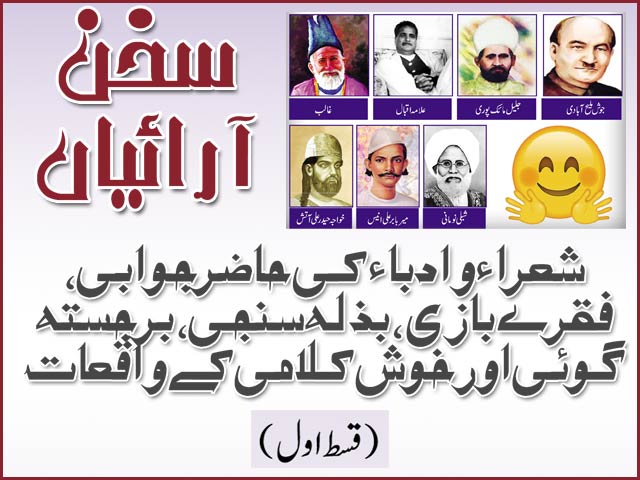(part one)
The literature created in different languages of the world and all aspects of literature in the creations in the world are considered to be glorious, lively and long-lasting, which are not only a complete reflection of the natural feelings of man, but also the enjoyment of man by studying them. The material for the satisfaction of nature can also be sold.
If Urdu literature is evaluated in the context of this principle, it can be presented as a perfect example of literature both in terms of poetry and prose. Apart from the rich and unique genres of poetry, Urdu prose literature is also enviable and worthy of study due to its high gender diversity.
Going further in prose literature, the genre of humor is more popular than other genres, one of the main reasons for which is that man is an “intelligent animal” and naturally, he likes humor, humor, and humor. It has to be. This is the reason why Hazrat Insan, due to this characteristic of his, is prone to humor in contrast to other states of his mood.
Therefore, to satisfy his natural taste, fantastic writing efforts in the prose and poetry literature of Urdu humor came to the fore, in which there is a galaxy of reliable names from Jafar Zatli to Anwar Masood on the poetry horizon of comedy. And on the other hand, its prose part appears to be famous with many names from Pandit Ratnath Sarshar to talented writers like Mushtaq Ahmed Yousufi.
But aside from these honors, the fact is also certain that no new addition has been made in Urdu prose humor under any new title or new writing experience, but only the genres of serious Urdu prose literature have been given the color of fiction. The work was carried out by adaptation and even in the present time this method is maintained as it is.
Even if it is not a new creative experience, thanks to research and editing, a sense of freshness could definitely be created in it under new topics, according to the poet:
But it takes more effort
Even the vast and rich collection of events containing the natural sense of humor of the poets and writers in the well-known Urdu poems, personal sketches, biographical essays and literary memoirs was neglected and it was not preserved in a regular and separate form. No significant effort has been made, whereas a substantial increase in Urdu prose humor is possible in the form of written preservation of these “cheerful sayings”.
In view of this point, in the article under the title of “Sakhon Arayan”, a few selected, unique ones are selected from the innumerable notable incidents of famous Urdu poets and literati’s retorts, phrasing, witticism, boldness and eloquence. And this subtle selection of short stories serves. With the belief that this effort will prove to be of great benefit to the growth of Urdu prose humor as well as the enjoyment of Urdu humor readers.
During the childhood of Mir Anis, the villagers complained to his father Mir Khaliq about his mischief. Mir Khaliq came towards the house looking for him to reprimand him. Fearing his father, Mir Anais climbed the wall under the cover of a henna tree in the compound of the house. He was eight or nine years old at that time. When Mir Khaliq reached under this tree, Miranis recited the following verse:
I sit down on the henna leaf and write my heart’s content
Perhaps the hands of the enchantress will gradually come!!!
Mufti Sadruddin Azarda passed in front of Mirza Ghalib’s house, but as he was in a hurry at that time, he did not consider it appropriate to stay with Mirza. Urged the Kahars to hurry, they started to change shoulder, but Azarda had to reach home soon, so he did not let them change shoulder. Ghalib was watching this situation from the hall of his house. He immediately recited this poem and wrote the Rak’ah and sent the man’s hand to the Mufti Sahib:
They pass through the streets of Panas
The shoulders also do not allow the hips to change
Azarda read the poem and at that time he came to Mirza Sahib and expressed his compulsion, apologized and after agreeing to Mirza Sahib, Azarda returned home.
During the time of Sheikh Naskh, there was a mushaira like “Taqdeer pas pasht, shabba pas pasht.” In it, great contemporary poets of Lucknow recited ghazals. Along with Nasakh, one of his servants was also participating in the mushaira. During the actual mushaira, he said, “A poem has also been appropriated by Khadim, if permitted!!” Some people considered his action to be crazy, but others said, “What’s wrong, let me read it.” Therefore, with great difficulty, he got permission, so Ghulam recited this verse:
The Zalfs got forgiveness from Rukh Taban
The peak has got the tri jagir back
Mir Muhammad Ali Hashmat himself was a Persian ghazal poet, but in Rekhta he had inspired many students, among whom the name of Mir Abdul Hai Taban was famous everywhere. Taban had such a love for the teacher that it would not be out of place to call him a proverb. His poem about the teacher became very famous:
Don’t believe anyone who looks at Hashmat
He is the enemy of Muhammad and Ali
Since the teacher’s name was Muhammad Ali and Mir Abdul Hai himself was a Syed, this poem has become even more funny.
Once a few students of Lucknow Medical School were sitting discussing the medical problem that when food enters the body, it becomes a part of the body. Khawaja Ishrat Lucknowi was also sitting nearby. You naturally said:
The sages say that food is a part of the body
We are dissolved by grief
The contemporary spectacle of fire and destruction was in full swing. One day a special mushaira was organized by the king. Atash was invited but deliberately neglected his disciples, while Nasakh was present with all his disciples.
One of the special features of Mushaira was that when a poet finished his speech, he would get up and leave. When the turn of the fire came, the signs of witchcraft were appearing and the bozm of the mushaira was completely empty.
At night, there was a crowd of moon and stars in the sky
When Khurshid came out in the morning, the information was clear
Hakeem Danish Lucknowi lost his sight in his later life due to poor eyesight. When he was honored to be invited to a mushaira, he stood up after reciting only one verse:
I can see neither the bartender nor the pub
It is the last age, fill up the scale
Sheikh Qalandar Bakhsh Jarat was blind. His contemporary poet Zahoorullah Khan Nawa wrote the following poem about him and praised him:
They said to Raat and put his hand on Joro’s mouth
The hands of the blind are tied to the truth
Munshi Sahib was a historian and poet of Rai Afada Asfi. One day Asif-ud-Daula was passing through the gate of Aish Bagh, he saw that a parrot had made its home in the open mouth of the lion statue installed on the gate. Nawab smiled and looked at Roy. He folded his hands and said:
Qurban Shah’s charity is a sign of justice
Which is the parrot’s nest in the lion’s den
When Nawab Asif-ud-Daula started building an unnecessary imam bara to keep the illusion of white-clad people, a laborer who did not know how to do anything came to work. They were asked to sound the curtain. He climbed on a high platform and headed towards the palace of Nawab Asif-ud-Dullah and shouted:
Residents of Khalid-e-Brin, tell the Horus to be veiled
The seal has been placed on the sky
He was a famous poet Maher Lakhnavi.
Shaykh Bahadur Ali Shujaat, the Lucknow Fermanroy, during the reign of Amjad Ali Shah of Oudh, used to get salary from Khazana Shahi thanks to Debir-ud-Dullah. When Saeed-ud-Daula Ali Muhammad Khan Bahadur Shahi assumed the post of Treasury Minister, the government benevolence reduced the salaries of the treasury employees. Shujaat Lakhnavi recited a poem in the style of Saeed-ud-Dawlah which became very famous:
That the entire creation cries because of his presence
If the head of Saeed is cut off, Eid is celebrated
Jalil Manik was the country poet of the entire Ottoman court. He was a teacher of Nizam-i Hyderabad in poetry. Once when the Shah of Hyderabad was filling the scale, Ustad saw Jalil and said, “Ustad! Write a poem on this situation. Jalil Manik Puri said after remaining silent for a few moments:
The pub has a wonderful color in the flower season
The glass bends down to kiss the mouth of the scale
Kazim Javed was a famous poet of Lucknow. Once he was leaving a friend’s house when it started raining. When the feet fell in the mud, splashes of water flew on the clothes. If it was unpleasant, he adapted the verse according to the situation:
The splash that flies from the feet comes to the head
Like the stars, the earth also haunts us
Agha Hyder, a resident of Lucknow, who was known as Aghazahin, people once said to him, “Agha Sahib!” You have become weak, why should you remember God, after all you have to give your life, even pray sometime.” Hearing this, Agha Sahib said with a long sigh:
One who remembers the martyrdom of Hussain
I don’t want to live the prayer by doing ablution
People said, there are! Agha sir! What did he say? Agha Sahib immediately recovered and said, “I was just going to say this.”
What reminds me of Hussain’s martyrdom
We perform ablution with tears while praying
Afta B Rai was a disgraced poet. Once, while going to Meerut, he saw on the way that a Sahib-e-Jamal boy was flying a kite over the hut. Seeing this, the boy shyly hid his face in the kite’s fur. Disgracefully said the poem:
Why do you make the hijab face up with paper?
A candle is not hidden in a kite’s coat
Shibli Naumani Sahib liked the company of Atiya Faizi Begum, a well-known character of Urdu history. When he learned that Atiya had married a Jew (Rahimin) after converting him to Islam, Allama wrote a letter to Atiya and sent it with the following verse:
India used to make Muslims infidels
Thanks to “atiya” today a disbeliever is a Muslim
Allama Iqbal’s teacher Shams Ulama Mir Hasan had a dear friend who was heavy. Mir Hassan turned around and saw Iqbal’s condition and said, “Iqbal! It’s also hard to bear.”
So Barjasta came out of Allama’s tongue, “Your favor is very heavy.”
An All India Urdu Hindi Mushaira was organized once by the Lucknow Assembly. A Hindu comic poet said in one of his poems that there is nothing else in Urdu poetry except Chuma Chatti. This matter was unpleasant to the Urdu poets present in the Mushaira. Later, an Urdu poet, Aftab Lakhanvi, recited one of his ghazals, in which he responded to the Hindi poet and addressed the Hindi poet and said:
What will you understand the difference between Hindi and Urdu?
Where are the hemp sticks, where are the scales of the congregation?
At one time, a bottle of Golden Ribbon Beer, a provincial liquor, became nine annas from eight annas, and Kafi Dehlavi wrote this poem on this increase:
The cafe became expensive wine and left
The infidels were converted into Muslims by the poor
Hosh Bilgrami was also present at a private gathering of poets and writers at Fani Badayoni’s house in Hyderabad Deccan. At the same time, excitement also reached him. Fani welcomed and told that Hosh Sahib was also present, so Josh Sahib said in an instinctive manner:
Tell “consciousness” to go away and “enthusiasm” will come
(function(d, s, id){
var js, fjs = d.getElementsByTagName(s)[0];
if (d.getElementById(id)) {return;}
js = d.createElement(s); js.id = id;
js.src = “//connect.facebook.net/en_US/sdk.js#xfbml=1&version=v2.3&appId=770767426360150”;
fjs.parentNode.insertBefore(js, fjs);
}(document, ‘script’, ‘facebook-jssdk’));
(function(d, s, id) {
var js, fjs = d.getElementsByTagName(s)[0];
if (d.getElementById(id)) return;
js = d.createElement(s); js.id = id;
js.src = “//connect.facebook.net/en_GB/sdk.js#xfbml=1&version=v2.7”;
fjs.parentNode.insertBefore(js, fjs);
}(document, ‘script’, ‘facebook-jssdk’));



